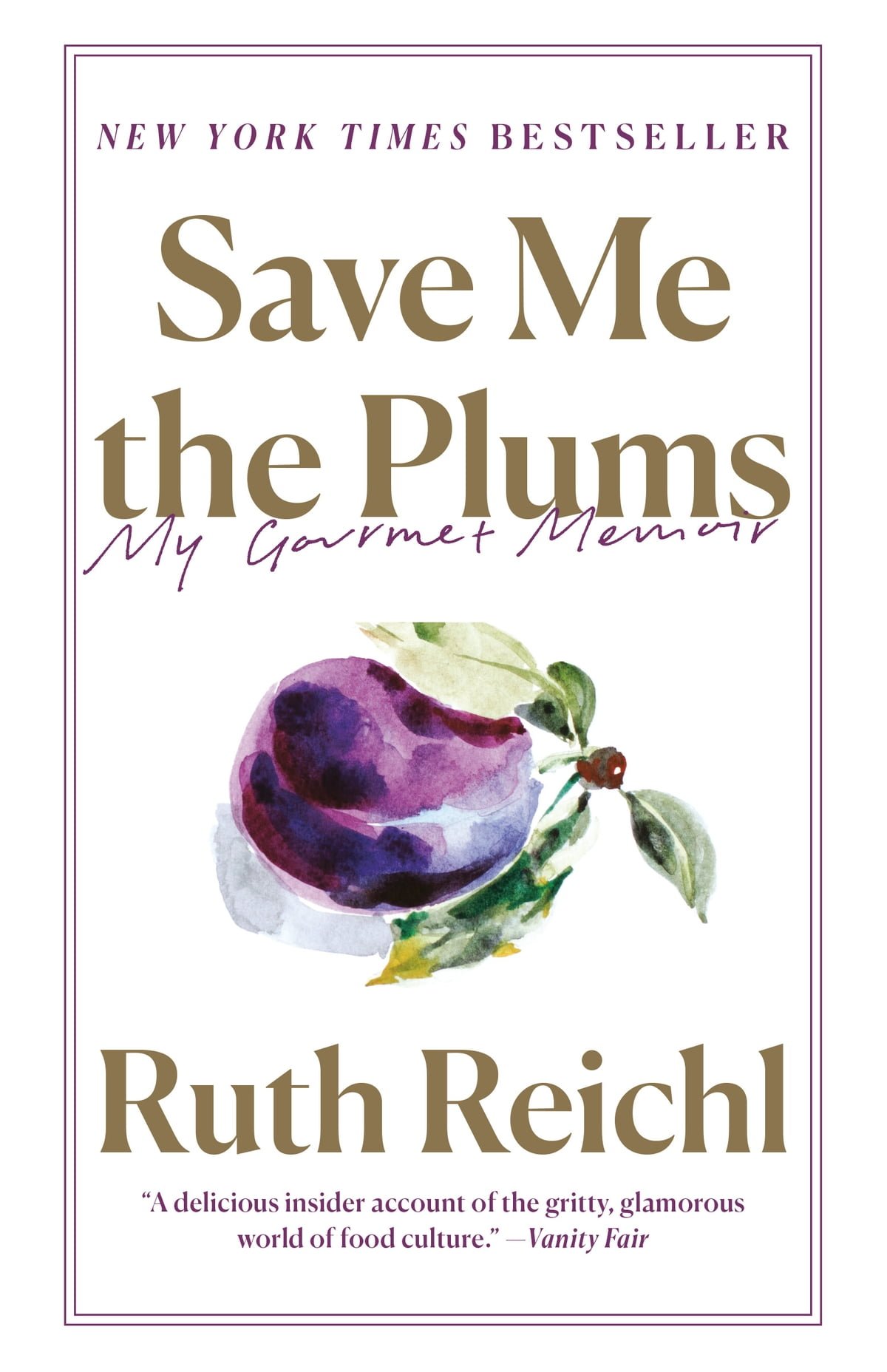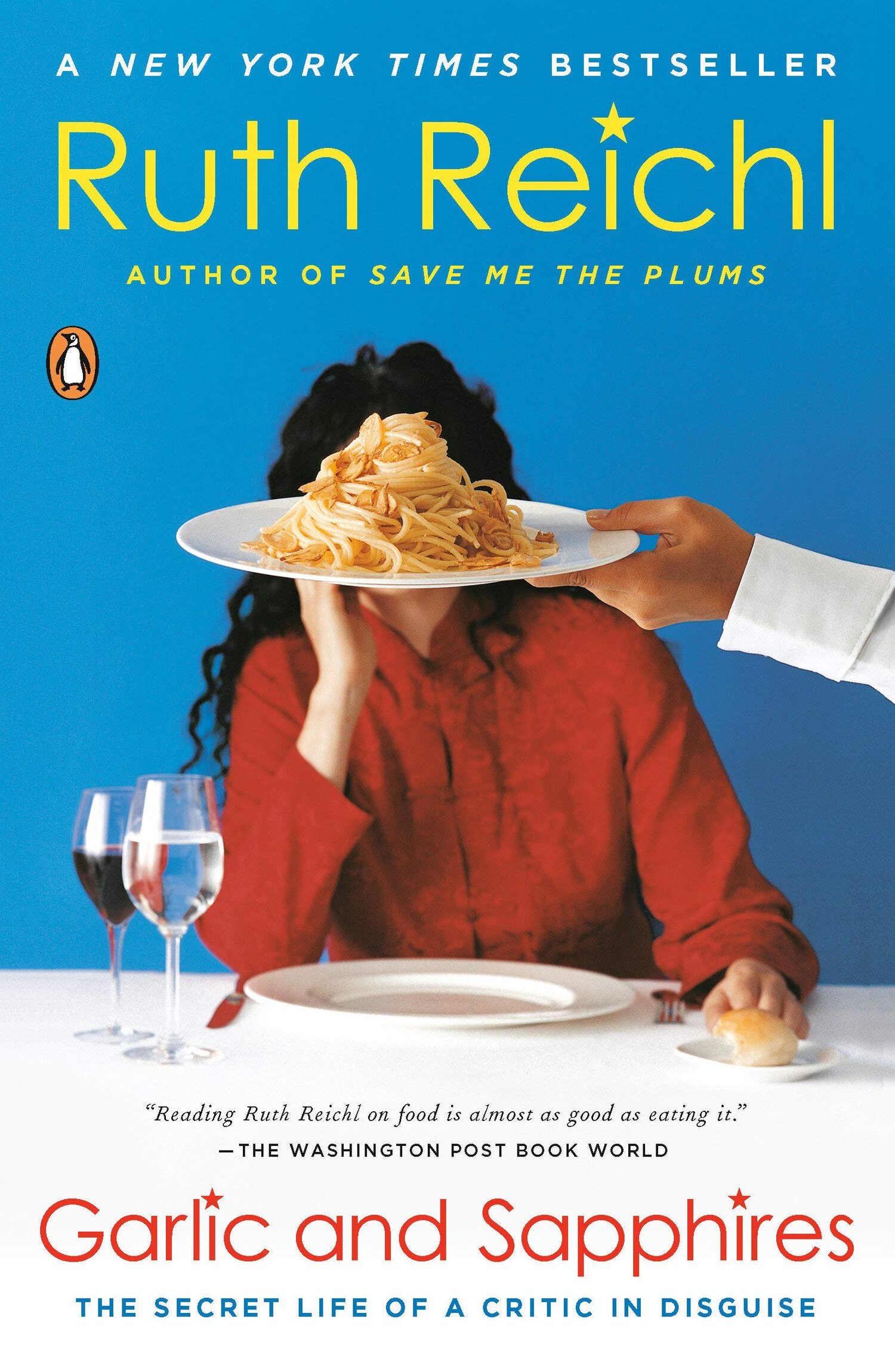Comfort Food for the Soul
American chef and food writer Ruth Reichl’s memoirs and novels are my comfort food for the soul. They are soaked in raw emotions seasoned in anecdotal nuggets filled with ebbs and flows, pleasure and pain, joys and sorrows, soft and hard places. They feel like a warm hug that sparks up my day with hope and a dose of joy. They are satiating palate cleansers that leave me craving her next book.
The former editor-in-chief of Gourmet is the author of best-selling memoirs Tender at the Bone: Growing Up at the Table (1998), Comfort Me with Apples: More Adventures at the Table (2001); Remembrance of Things Paris (2004); Garlic and Sapphires: The Secret Life of a Critic in Disguise (2005); Not Becoming My Mother: and Other Things She Taught Me Along the Way (2009); For You Mom, Finally (2010); My Kitchen Year (2015) and Save Me The Plums: My Gourmet Memoir (2019). Her debut fiction novel Delicious! is a sumptuous gastronomy fare set in an imagined New York town where food, heavily influenced by immigrants and their descendants from Europe, abounds.
“No one writes about food like Ruth Reichl. She also happens to be a mesmerising storyteller. I consider this book essential nourishment,” wrote ‘Domestic Goddess’ Nigella Lawson in praise of Ruth’s Save Me The Plums.
“A good book is comfort food, and you finish Reichl’s as you finish a good meal, satisfied, content, hopeful. With a sense that we need to cook for another more, pay attention to the everyday, realize that the everyday is momentous,” opined Greensboro News & Record on Comfort Me With Apples.
“Reading Ruth Reichl on food is almost as good as eating it. She is so appreciative and so inclusive that what she’s describing becomes accessible, even when it’s a meal on a remote mountainside in Crete… makes the reader feel present with her, sharing the experience.” – Washington Post Book World review of Tender at the Bone.
“Reichl’s vivid descriptions of food will have readers salivating, and an insider’s look at life at a food magazine is fascinating. Her satisfying coming-of-age novel of love and loss vividly demonstrates the power of food to connect people across cultures and generations.” – Library Journal on Delicious!
Born in 1948 in New York City, Ruth began her food-writing career with Mmmmm: A Feastiary, a cookbook, in 1972. She moved on to become food writer and editor of New West magazine in 1978, then to the Los Angeles Times as its restaurant editor (1984 – 1993) and food editor and critic (1990 – 1993). She became the restaurant critic for The New York Times in 1993. In 1999 she left the Times to assume the editorship of Gourmet, which she managed until it closed in 2009.
As editor and critic, she was known for her ability to “make or break” a restaurant with her honest, no sugar coated review. Indeed, she was on a mission to "demystify the world of fine cuisine".
Despite her success and tales of how she used to disguise herself to be incognito while reviewing restaurants, she was quite open about why she stopped: “I really wanted to go home and cook for my family. I don't think there's one thing more important you can do for your kids than have family dinner.”
A rare breed of storyteller, Ruth is one of the inspiring writers I have on my short wish list of people I dream of interviewing. I don’t know if that day will ever come.
In the meantime, I’d like to share one of the best interviews I’ve come across. Here are excerpts of Ruth’s interview with Alison Beard that first appeared on Harvard Business Review magazine in June 2014. Her insights on work-life balance, writing, women in leadership roles, and people management resonate to this day.
Life’s Work: An Interview with Ruth Reichl
Image from the Harvard Business Review Magazine, 2014. Photography: Spencer Heyfron
Ruth Reichl says that the best career moves are the ones that scare you. First a cook, then a critic and a memoirist, and then the editor of Gourmet until its abrupt closure, in 2009, she’s learned to embrace transition. When her latest venture, the luxury food site Gilt Taste, was also shut down, she turned to fiction writing […]
How did you make the switch from individual producer to manager when you took over at Gourmet?
It’s not evident from my résumé, but I’d actually been a manager before—at the LA Times. I kept complaining about the food section, which at the time was the largest in the country – 60 or 70 pages every week, with a big staff, test kitchen, and photo studio. So I was sort of blackmailed into becoming the editor. One day I was the restaurant critic, and the next day I had 20 people working for me. They kept saying, “We’ll give you management lessons,” but I never had time, so the learning curve was really steep. I was not initially the best manager. I inherited people who were really different from me. They were home economists, not writers or reporters. In the beginning I said, “Just give me your notes, and I’ll write it all.” It took a while for me to understand that management is an art, and to appoint a woman who was good at it as deputy. We learned from each other. My great triumph with her was that at the end of two years, she came to me and said, “I’m quitting, because being around you has made me realize that I’ve spent my whole life doing something safe, and if I’m ever going to find out what I really want to do with my life, now is the time.” She drove all around the country and ended up in Portland. And I learned that you really can’t expect everyone to be just like you. The big secret of management is to find what people do best, not to fit them into a mold. Find out what everybody on the staff does well and tailor their jobs to them, instead of the other way around.
Do you think that as leaders, women bring something to the table that men don’t?
I do. I think woman leaders are one, more practical and two, much more sensitive to the whole issue of balancing work and family, which is the big problem facing corporate America today, everywhere from restaurants to big businesses. We need to find much better solutions so that people can have satisfying home and work lives. Every time some young editor at Gourmet came to me and said, “I’m pregnant,” I would say, “Now you’re going to understand what guilt is: If you’re at work, you’ll feel like you should be home. And if you’re home, you’ll feel like you should be at work. No matter where you are, you’re going to feel guilty.” As a nation, we have to solve that problem.
So how did you manage your own work/life balance, especially when your son was growing up?
With a huge amount of guilt. By sleeping very, very little. By trying to do it all and probably failing at everything. But I’m a natural workaholic, and I was lucky to have a lot of very good helpers. Being a restaurant critic was actually good too. Because I had to go out to dinner every night, I would leave the office at two, pick Nick up from school, and spend the afternoon with him. So I was also lucky in that when he was really young, I didn’t have a corporate job. Then, when he was 10 and started saying, “Why don’t we ever have family dinner?,” I went to Gourmet, and I got religious about coming home to cook every night, which just required planning ahead on weekends to get the food into the house so that I could get dinner on the table quickly.
You’re known as not only the last editor of Gourmet but also the one who modernized it, winning lots of awards in the process. How did you go about that?
It wasn’t difficult. The magazine had been managed very much from the top down. Editors were told, “You’re going to do this, this, and this.” They literally never had a meeting. I went in and said, “Look, we have a mandate to do anything we want. What do you think we should do?” And at that first meeting, I didn’t open my mouth for three hours. What the staff wanted to do was exactly what I wanted to do, and what I think any sane person who was passionate about food in 1999 would have wanted to do. Gourmet had never gone to the farms before and talked about who was growing our food; no epicurean magazine had. Our first produce issue – which became quite famous—wasn’t my idea. It was the staff’s. They were all eager to take control. And I wanted them all to feel they had a stake in the magazine, so if someone fought hard for an article I didn’t like, I would put it in anyway. I’m a very good boss for people who don’t want to be told what to do. And the people who did want to be told left pretty quickly. I think I fired one person, even though Condé Nast had told me I’d probably have to clean house. Maybe it’s because I’m a womanI – I don’t know – but it never crossed my mind that I was just going to fire everyone. Instead I thought, “There’s a lot of incredible knowledge here, so let me figure out who does what, and surely we can make it work.”
Besides initiative, what qualities did you look for in employees?
Mostly I wanted people smarter than me in different ways: an art director who knew way more than I did about what a magazine should look like; editors with really out-there ideas; a copy editor who was the biggest nitpicker on earth. I wanted people who were very good at one thing, and I wanted to empower them.
Looking back, is there anything you wish you’d done differently?
I would have managed up better. I would have spent more time making friends with the corporate people at the top. It was stupid of me not to have done that. But the things people cited as the reasons Gourmet closed—we were too ambitious, we stretched too far or pushed the envelope too much—I wouldn’t change one bit. To me, working is about trying to do the best you can. I would not go back and make a less good or a less passionate magazine. I just wouldn’t.
That’s not always easy in practice, though. How do you force yourself to take those leaps?
You look down the road 10 or 15 years and say, “Do I really still want to be doing what I’m doing? Don’t I want to be challenged?” One of the secrets to staying young is to always do things you don’t know how to do, to keep learning.
Circling back to your career choices, how did you know when a dramatic move you were making was the right one?
I always thought they were the wrong ones. When I was offered Gourmet, I told one of my adopted mothers, “It’s just not the right time. If it were a year down the road, I would do it.” And she looked at me and said, “Ruth, it’s never the right time.” It’s the best advice I’ve ever gotten. It’s the things that scare you the most that you have to do.
What else have you learned from your mentors?
My first boss, Rosalie Wright, at New West magazine, was a real role model for me in how to be a boss. She was one of those fantastic woman managers: She was extremely forthright and good at what she did, and thought nothing of answering her own phone. And M.F.K. Fisher once wonderfully told me that it was time for me to work at a newspaper, because I was polishing every word and I needed to have the experience of knowing that the next day, people would be wrapping fish in whatever I was writing.
Ruth writes with so much simplicity. Reading her books is like having a conversation with her seated just opposite me across the dining table laden with delicious dishes. As The Washington Post Book World puts it: “Reading Ruth Reichl on food is almost as good as eating it... [she] makes the reader feel present with her, sharing experiences.”
If you haven’t yet, I encourage you to pick one or two of Ruth’s 10 books, nine of which are memoirs, written and published over a span of 20-plus years. They are available on Amazon last I checked. Ruth’s next book, The Paris Novel, is slated for release in April 2024.
● Tender At the Bone
● Comfort Me with Apples
● Remembrance of Things Paris
● Garlic and Sapphires
● Not Becoming My Mother
● Gourmet Today
● For You Mom, Finally
● Delicious!
● My Kitchen Year
● Save Me the Plums
Tender At The Bone, Garlic and Sapphires, and Save Me The Plums are my go-to comfort reads. They feed the heart and soul.
Debbie | ws







